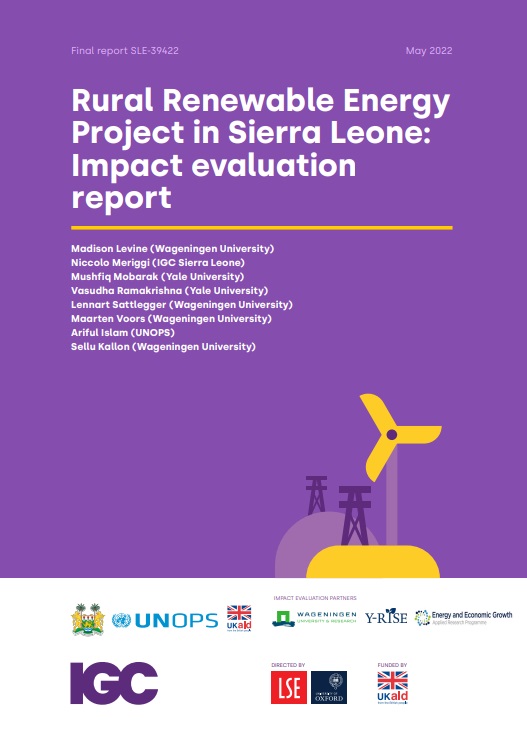🌿 COP 30 - Building a Greener Tomorrow
The 30th UN Climate Change Conference (COP 30) is taking place in Belém, Brazil. Stay informed about global climate actions, negotiations, and live sessions from 10 – 21 November 2025.
Get Updates
Rural Renewable Energy Project (RREP), Sierra Leone Endline Impact Evaluation Report

Files
Date
January, 2024Author(s)
- Madison Levine
- Niccolo Meriggi
- Mushfiq Mobarak
- Vasudha Ramakrishna
- Lennart Sattlegger
- Maarten Voors
- Ariful Islam
- Sellu Kallon
Abstract
In rural Sierra Leone, household CO2 emissions come almost entirely from lighting and cooking. Prior to electrification (at baseline), the primary lighting sources were battery-powered lamps and solar lanterns for 90 percent of respondents, with 1.8 percent respondents reporting the use of diesel generators. Energy used for cooking was primarily through either firewood or charcoal for 99 percent of respondents prior to electrification. RREP community residents are quickly transitioning from more traditional fossil fuel energy sources to mini-grids. We find that respondents in RREP communities change energy use: households in RREP communities are more likely to have access to light and less likely to use diesel generators for lighting. The same holds when we restrict the analysis to connected households. However, it will take time for this transition to have a substantial impact on the environment (e.g. reduced CO2 emissions) and livelihoods (e.g. allow people to adopt more “productivity enhancing technologies”). We do not yet see a significant reduction in the use of other high-emissions energy sources, such as kerosene or firewood for both cooking and lighting. This is not surprising so soon after electrification: the energy transition to "cleaner technologies" requires time and investment in information and other marketing/financing strategies. Cleaner appliances for lighting and cooking can be expensive, and the investment necessary represents a substantial hurdle for cash-strapped households. Should appliances for cleaner lighting and cooking become more abundant/accessible and get cheaper (possibly through temporary subsidization), uptake should increase if evaluated over a longer duration of time.
Citation
Rural Renewable Energy Project (RREP), Sierra Leone end line Impact Evaluation Report; 2022; UNOPS P116.
Publisher
UNOPS
Rights Holder
UNOPS
URI
https://knowledgehub.pksf.org.bd/collections/Z214VUJNSDIvaXIxeXNXUHQrVWh3UT09
